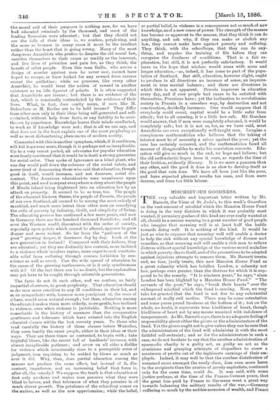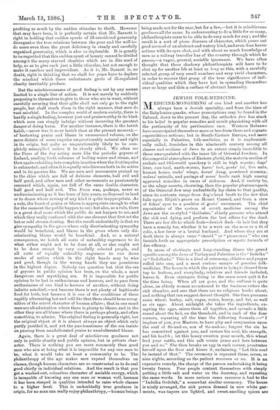MISCHIEVOUS GOODNESS.
THE very valuable and important letter written by Mr.
Barnett, the Vicar of St. Jude's, to this week's Guardian on the vast amount of mischief which the Mansion House Fund is doing in the very districts in which it was probably most wanted, if pecuniary gushes of this kind are ever really wanted at all, should be a serious warning to a great number of good people who imagine that meaning well is at least half the battle towards doing well. It is nothing of the kind. It would be. just as wise to suppose that meaning well will enable a doctor to help the sick without any special knowledge of disease and remedies, as that meaning well will enable a rich man to relieve distress without special knowledge of the various moral maladies- in which poverty shows itself, and of the precautions to be adopted against injurious attempts to remove them. Mr. Barnett treats, - and, we fear, justly treats, this new Mansion House Fund as- a great calamity which has London, a calamity not less, perhaps even greater, than the distress for which it is sup- posed to be the remedy. "It is nineteen years," he says," since London has been blighted by a Mansion House Fund." "The servants of the poor," he says, "break their hearts" over the widespread mischief which the fund is causing. Now, we may take for granted that the fund is not due to any substantial amount of really evil motive. There may be some ostentation and some purse-proud fussiness at the bottom of it ; but on the whole, no doubt, it represents true kindliness of heart, though kindliness of heart not by any means unmixed with indolence of temperament. As Mr. Barnett says, there is no adequate feeling of responsibility about either the givers or the administrators of the fund. Yet the givers ought not to give unless they can be sure that the administrators of the fund will administer it with the most faithful self-restraint ; and as for the administrators in such a case, we do not hesitate to say that the careless administration of spasmodic charity is a guilty act, as. guilty an act as the avaricious and grasping attempts of slopaellers to screw a maximum of profits out of the legitimate earnings of their em- ploy6s. Indeed, it may well be that the careless distribution of unearned sums amongst the needy class, does even more harm to the recipients than the avarice of greedy capitalists, continued only for the same time, could do. It was said, with some justice perhaps, at the time of the Franco-German peace, that the great fine, paid by France to Germany went a great way towards balancing the military results of the war,—Germany suffering so mueh by the sudden accession of wealth, and France
profiting so much by the sudden stimulus to thrift. However that may have been, it is perfectly certain that Mr. Barnett is right in holding that sudden spurts of ill-considered generosity disorganise the true relations between the poor and the well-to- do more even than the great deficiency in steady and carefully organised generosity, which is also so deplorable. It is greatly to be regretted that this sudden spurt of bounty cannot be divided amongst the many starved charities which are in dire need of help, so as to give each just a little stimulus, but not enough to make it careless and improvident. As it is, Mr. Barnett is, no doubt, right in thinking that we shall for years have to deplore the mischief which these unfortunate gusts of ill-regulated. charity inevitably produce.
But the mischievousness of good feeling is not by any means limited to a single line of action. It is not merely by suddenly proposing to themselves to give to those who are in want, without carefully securing that their gifts shall not only go to the right people, but shall reach them in the right manner, that men do vast mischief. In the complex world of modern society, there is hardly a single feeling, however just and praiseworthy in its kind, which men can simply indulge without incurring the greatest danger of doing harm. For another instance, there is the lavish habit,—never was it more lavish than at the present moment,— of bestowing praise and blame in unmeasured volume, on the mere dictate of some impulse unquestionably natural and right in its origin, but quite as unquestionably likely to be com- pletely misapplied unless it be closely sifted. We often see the Press of the day acting more like the periodic geysers of Iceland, sending forth columns of boiling water and steam, and then again subsiding into complete inaction when the firstimpulse is exhausted; and often it is equally mischievous both in its active and in its passive fits. We see men and movements praised up to the skies which are full of dubious elements, half evil and half good, and other men and other movements as passionately censured which, again, are full of the same double character, half good and half evil. The Press was, perhaps, never so undiscriminating as it has been of late years, so disposed to laud or to damn where ecstasy of any kind is quite inappropriate. As a rule, the burst of praise or blame is appropriate enough to what for the moment the public happen to see ; but also, as a rule, there is a great deal more which the public do not happen to see, and which they really confound with the one element that first set the hot or cold stream flowing. But the result undoubtedly is that we give sympathy in the gross where only discriminating sympathy would be beneficial, and blame in the gross where only dis- oriminating blame would be beneficial. And, as a natural consequence, we hatch all sorts of unhealthy eagerness to do what either ought not to be done at all, or else ought not to be done except by very carefully selected people, and all sorts of equally unhealthy eagerness to run down modes of action which in the right hands may be wise and good, though in the wrong hands they are pernicious in the highest degree. Nobody can question but that the era of geysers in public opinion has been, on the whole, a most dangerous and mystifying era. It is impossible for public opinion to be lost in enthusiasms and horrors, and to pass from enthusiasms of one kind to horrors of another, without doing infinite mischief,—not because there is not plenty of legitimate food for both, but because it is one of the conditions of these rapidly alternating hot and cold fits that there should be no recog- nition of the mixed character of human affairs ; that in one mood men are all admiration where there is plenty to blame, and in the other they are all blame where there is perhaps plenty, and often something, to admire. The original feeling is generally right, but the original object of it is almost always an object which only partly justified it, and yet the passionateness of the era insists on passing from unadulterated praise to unadulterated blame.
Again, there is a great deal of mischievous goodness not only in public charity and public opinion, but in private char- acter. There is nothing you see more commonly than good men who aim at being what it is impossible for any one man to be, what it would take at least a community to be. The philanthropy of the -age makes men expend themselves on classes, though human characters are so constructed as to do real good chiefly in individual relations. And the result is that you get a washed-ont, colourless character of amiable energy, which is incapable of knowing any one man or woman well, because it has been steeped in qualities intended to raise whole classes to a higher level. This is undoubtedly true goodness in origin, for no man can really enjoy philanthropy,—human beings being made not for the race, but for a few,—but it is mischievous goodness all the same. In endeavouring to do a little for so many, philanthropists cease to be able to do very much for any ; and the result is a sort of pious dimness of character, which pours out good counsel of an abstract and watery kind, and even does heroic actions with its eyes shut, and with about as much knowledge of men as a railway traveller has of the country through which he passes,—a vague, general, amiable ignorance. We have often thought that these shadowy philanthropists will have to be shut up for another life at least as long as this, with a carefully selected group of very small numbers and very vivid characters, in order to recover that grasp of the true significance of indi- vidual qualities which they have lost in spreading themselves over so large and thin a surface of abstract humanity.







































 Previous page
Previous page